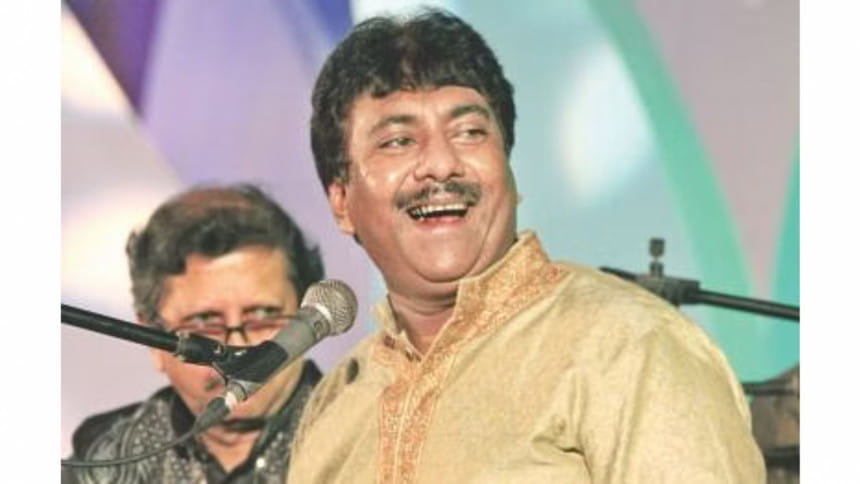A rare class of excellence

Despite the blistering heat and the inevitable traffic snarl-ups of Dhaka, we inched our way in anticipation from the airport to the Dhaka Club. Ustad Rashid Khan was to perform live in the evening at the 'Celebrating Life' event of The Daily Star and Standard Chartered Bank.
Though he had performed at a concert till dawn the previous night in Kolkata, he was in high spirits. This was his second performance in Dhaka and he was set to perform to a full-house.
My mind went back to an earlier visit to Kolkata, when we met Khan at his plush residence at Naktala. While he was being interviewed by BBC, we drove around the Sangeet Research Academy (SRA). Established in 1978, SRA was set up to preserve and promote Hindustani Classical Music. The academy organises classical music festivals every year in all major cities in India, showcasing the best of talent. The academy also hosts performances by stalwarts such as Pandit Ajoy Chakrabarty, Ustad Rashid Khan, Pandit Arun Bhaduri, Shubhra Guha, Samarth Nagarkar, Arshad Ali Khan, Supratik Sen Gupta and many more.
Once we finished our tour of SRA, we launched into an animated conversation with Khan. The wooden panelled room was adorned with his tanpura, harmonium and tabla. The French window overlooked the beautiful rose garden on the terrace.
We spoke of his musical journey: "My rewaz schedule, as a child of six, was quite traumatic. I had to practise the standing notes, which could at times stretch non-stop for five to six hours. That was my grandfather Ustad Nissar Hossain's style of mentoring me. To avoid all this, I would sometimes flee the scene!"
"There is no fixed time for rewaz, but sargam and palta are everyday necessity. Seasons have a powerful hold on me. I enjoy the barsaat -- the rainy season. My favourite ragas are Malkous, Puriya, Desh, Bagesree, Marva -- and many more depending on the mood," he said.
"When I was 11, I came to Kolkata and began to perform. However, my real emotional attachment to music came later, at the age of 18."
The most prominent classical vocalist in contemporary times, Ustad Rashid Khan has established his own style, which many of his ardent fans refer to as the Ustad Rashid Khan Gharana. The Rampur-Sahaswan gayaki (style of singing) is closely related to the Gwalior Gharana, which features medium-slow tempos, a full-throated voice and intricate rhythmic play. Khan includes the slow elaboration in his vilambit khayals in the manner of his maternal grand-uncle. He is also a master of the tarana like his guru but sings them in his own style, preferring the khayal style. His mastery of all aspects of tonal variations, dynamics and timbre manipulation saw him awarded the title of 'Ustad' at a very young age. How does one feel when such a rare honour is bestowed at such an early stage, I asked him. Khan's modest answer, "One should work on one's skills, the rest follows."
Khan has made a radical difference to the way classical music is performed. His renderings stand out for the emotional overtone in his melodic elaboration. This imparts a touch of modernity to his style, compared to the preceding maestros who placed greater emphasis on impressive technique and skilful execution of difficult passages. The spontaneous emotional appeal of his singing, be it in the melodic elaboration or in the upper octave pukaars, has won him accolades and enthusiastic followers the world over.
Khan is optimistic about the future wave of musicians, saying, "Quite a few young artistes are now coming up in the classical music scene. When I do playbacks, my primary aim is to attract the young listeners to the genre by fusing classical with the modern trend."
The Dhaka audience is much excited about the four-day Classical Music Festival -- jointly hosted by Bengal Foundation and ITC-SRA of India -- from November 29 to December 2. The elaborate initiative has been dedicated to Sangeet Samrat Ustad Allauddin Khan.
Eminent music maestros are set to enthral music lovers at the grand classical music festival in Dhaka. The festival features performances by maestros from Kolkata ITC-SRA as well as accomplished Bangladeshi artistes in classical vocal and instrumental music along with classical dance.
"Poetry and music are the finest medium of proximity to the Almighty" -- said renowned Persian Poet Mawlana Jalaluddin Rumi. With a capacity crowd of over 10,000, expected to attend on each of the four days of the festival, classical music -- the foundation of all music -- is being showcased on one of the biggest stages to an eagerly expectant audience.

 For all latest news, follow The Daily Star's Google News channel.
For all latest news, follow The Daily Star's Google News channel. 



Comments